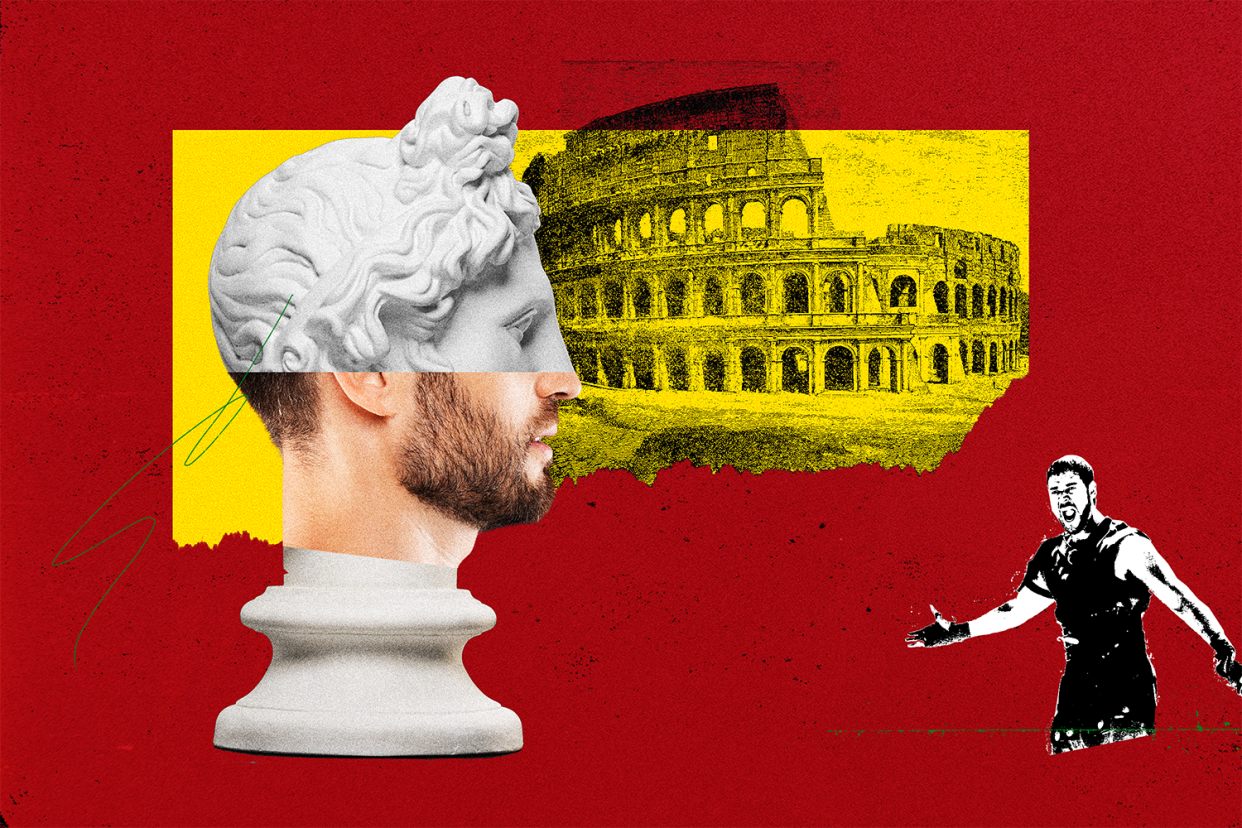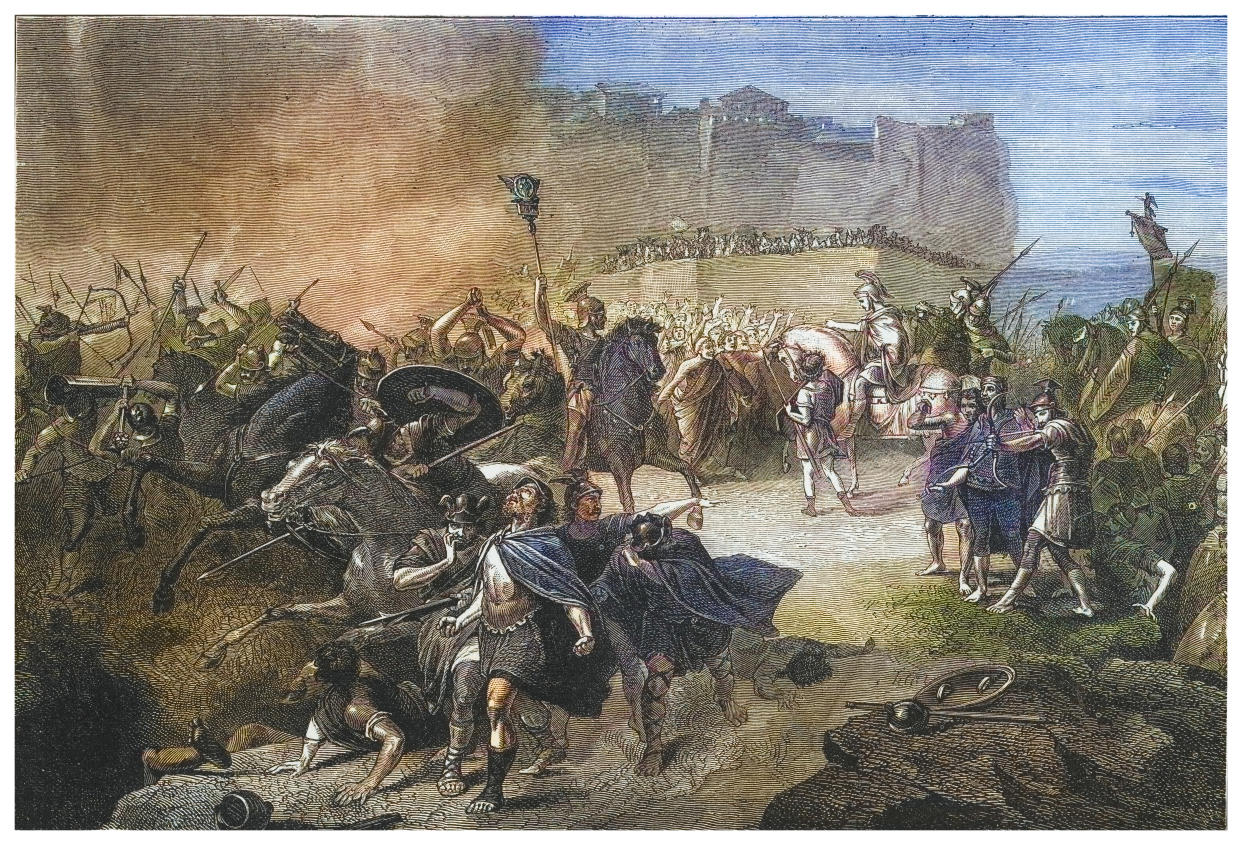Why is everyone talking about the Roman Empire? Inside the TikTok trend that's become a surprising litmus test.

How often do you think about the Roman Empire? If you have an answer, you’re not alone.
The Roman Empire is seeing a surprising resurgence this week, thanks to a recent TikTok trend, where videos with the hashtag #theromanempiretrend raked in more than 31 million views, and videos related to the Roman Empire amassed over 1.3 billion views and counting.
Why the sudden interest? Could it be related to politics or world events? Is there a connection to sports or competitive mindsets?
Yahoo Entertainment has the answers to all your burning questions.
How did the Roman Empire trend start?
According to reports, a Swedish influencer named Saskia Cort posted a video in September 2022 that encouraged her followers to ask their male partners how often they think about the Roman Empire, which went viral. Nearly a year later, Artur Hulu, a Roman reenactor based in Sweden, reignited the trend.
“Ladies, many of you do not realize how often men think about the Roman Empire,” Hulu, who goes by the handle @GaiusFlavius on Instagram, asked his followers in an August post. “Ask your husband/boyfriend/ father/brother — you will be surprised by their answers.”
Hulu’s post made its way to TikTok, where women shared personal anecdotes on the topic, some of which included snippets of them asking their boyfriends or husbands on-camera how often they think about the Roman Empire. Their answers were equal parts surprising and hilarious.
When one TikToker asked her boyfriend the question, he replied without missing a beat: “Once a month.”
“A week or two ago,” another responded when asked the last time he thought of it.
Some have even taken their explanations further: “I guess technically every day,” one man replied. “If you speak English, you think about the Roman Empire. You’re speaking a Latin-based language. So, indirectly, you’re thinking about it.”
Wait, what exactly was the Roman Empire?
The Roman Empire spanned from the British Isles to Egypt, with various rulers and forms of governments throughout its history. According to the History Channel, the city we know as Rome was founded in 753 B.C. It was initially ruled by kings, until around 509 B.C., when it became the Roman Republic.
However, civil wars started between opposing groups with different loyalties, which ultimately ended around 27 B.C., with the rise of August (Octavian) as the first Roman Emperor.

Historically speaking, the empire can be divided in two parts: the Western Roman Empire, which lasted until 476 A.D. (after the fall of the last emperor, Romulus Augustulus) and the Eastern Roman Empire, which lasted from the founding of its capital city Constantinople in 330 A.D. until it was besieged by the Ottoman Turks in 1453.
Throughout this time, the empire was responsible for important achievements like the Roman aqueducts, the Julian calendar and cementing Latin’s influence on modern language. Not to mention, it also brought us gladiators, combatants who fought in public spectacles, primarily in amphitheaters, for the entertainment of Roman spectators.
Why do men think about the Roman Empire so much?
“Lots of men in particular think Rome is cool, though it’s mostly just vibes combining mythic ideas around ancient Greece and Rome,” David Perry, a historian and co-author of The Bright Ages: A New History of Medieval Europe, explained in a CNN op-ed. “This popularity is evident in history classes, books, podcasts, TV shows, video games, movies and more.”
According to Erik Anderson, a marriage and family therapist who specializes in men’s issues, told USA Today, “It’s sort of like the great man version of history, where men rise to fame in 300 or Gladiator through direct physical means, prowess on the battlefield, force of rhetoric.”
Susanna Elm, a professor of history and ancient Greek and Roman studies at the University of California, Berkeley, told Harper’s Bazaar that men’s fascination may be credited to ideas around success, dominance and failure.
“The Roman Empire stands for an idea of successful management,” Elm explained. “Then, there is the ever-present notion of Rome’s fall. So, whenever you perceive your own society as being in crisis, then you think: Is this the moment? Are we now also falling? This is more pronounced in the U.S. because it is still a world power. So, like Rome, everyone always thinks it is declining. According to Rome’s historians, from the earliest time onward, Rome was declining, and the decline of the U.S. is also a recurring theme."
What do women have to say about it?
As seen on social media, women are perplexed.
I saw an IG Reel that said something along the lines of “women have no idea how often the men in their lives think about the Roman Empire.”
So I asked my husband: “How often do you think about the Roman Empire?”
And without missing a beat he said “Every day.”
YALL! Why!?— Rev. Kelsey Lewis Vincent (@KelseyMLoo) September 6, 2023
That doesn’t mean women don’t have their own Roman Empire that’s top of mind. When TikToker Emmy Rener took the opportunity to ask her viewers what the “female version” of the Roman Empire was, responses were equally surprising.
Turns out, women think about a variety of subjects — from Greek mythology and the Romanovs to murder to their ex-best friends.
How have celebrities responded?
Meta CEO Mark Zuckerberg shared his thoughts in a Threads post, writing, “Not sure if I think about the Roman Empire too much. I wonder what my daughters Maxima, August and Aurelia think.”
NFL’s Rob Gronkowski said “only when I watch the movie Gladiator, so once every three years.”
How often does @RobGronkowski think about the Roman Empire? 🤔🏛️ pic.twitter.com/4hTxpT8clH
— FOX Sports: NFL (@NFLonFOX) September 17, 2023
Carson Daly said on the Today show that he thinks about it “every day,” much to his co-hosts’s surprise.
“First of all, the movie Gladiator is in every guy’s top five favorite movies,” he explained. “There’s this trend to have this modern understanding of sort of ancient philosophies like stoicism; cold plunging is a big thing right now, keto. Looking for guidance and self-improvement, and it all harkens back to [Roman emperor] Marcus Aurelius, the Roman Empire.”
How often do you think about the Roman Empire? Our TODAY family is weighing in on the TikTok debate — and they all have very different opinions 😂 pic.twitter.com/RcA7Cp0dUt
— TODAY (@TODAYshow) September 15, 2023
So, are we all experts on ancient Rome now?
Probably not, but one thing’s for sure: The next time someone mentions the Colosseum or Julius Caesar, there’ll be more nods of recognition in the room.
